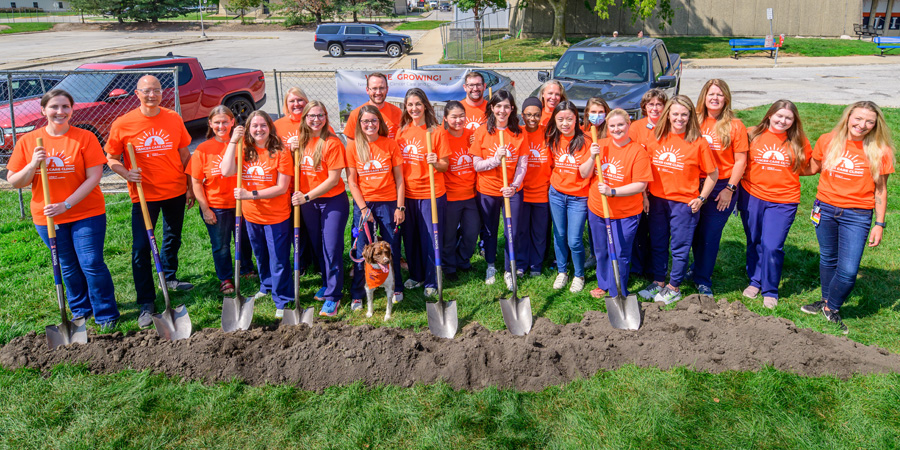This message will appear in the Illinois State Veterinary Medical Association Epitome.
Last year, Mars Veterinary Health released a study documenting what so many of us already knew first-hand: There’s a shortage of veterinarians, veterinary technicians, and veterinary specialists. The study projects a continuing shortage until at least 2030.
This shortage is evident at veterinary colleges across the country, from what I hear from my fellow deans.
In our Department of Veterinary Clinical Medicine, we have more than 90 faculty members, with the large majority holding one or more practice or specialty credentials. Nearly all spend some time seeing cases through our teaching hospital, our diagnostic laboratory, or one of our primary care services.
Given the state of the industry, it’s no surprise that VCM department head Dr. Anne Barger spends a great deal of her time on recruiting. Open positions arise both because faculty members retire or leave for another position and because we are growing our department to keep up with a growing caseload and student body.
Success in Recruiting; More to Come
I consider it a remarkable accomplishment that Dr. Barger’s team has brought two dozen new faculty members on board since the start of 2023. Even so, as of August 2024, the department had eight open positions and plans for an additional 14 searches in the 2025 academic year.
According to the Mars Veterinary Health report:
“… academic specialists are particularly critical to the future of the veterinary medical profession because they are directly responsible for training the next generation of veterinarians and for conducting the research whose results provide the new knowledge that will shape the practice of veterinary medicine in the future. Perhaps even more importantly, specialists in academia currently conduct the majority of the specialty training programs in most of the recognized specialties.”
The report concludes that the shortage of veterinary specialists in academia could have a substantial negative impact “on both access to care and quality of care for years to come.”
Who Are Our New Veterinary Faculty…
The educational and professional backgrounds of our newest faculty in the Department of Veterinary Clinical Medicine cover quite a lot of ground. Five of them earned their veterinary degree at our college. Others earned their veterinary degrees outside the United States, including in Mexico (Dr. Mariana Sosa-Higareda, zoo medicine), Nigeria (Dr. Shakirat Adetunji, anatomic pathology), and the United Kingdom (Dr. Christopher Kennedy, emergency and critical care).
Several new faculty members came to Illinois for an internship, residency, or both. After completing her medical oncology residency, Dr. Joanna Schmit spent 10 years in private practice before deciding to return as a faculty member. Dr. Bill Krug completed a residency in dentistry and oral surgery, launched a veterinary dentistry service at North Carolina State University, then practiced in Chicago for 10 years before joining our faculty.
Dr. Patrick Barko (small animal internal medicine), Dr. Matt Berry (medical oncology), and Dr. Felipe Martins (anesthesiology) all joined the faculty directly after completing their residencies here. Dr. Barko earned a veterinary degree from Washington State University, Dr. Berry from the University of Illinois, and Dr. Martins from José do Rosário Vellano University, Alfenas, State of Minas Gerais, Brazil. Dr. Maryanna Parker and Dr. Nick Noto joined our faculty after completing Illinois residencies in anatomic and clinical pathology, respectively. Dr. Parker earned her veterinary degree from North Carolina State University and Dr. Noto is a University of Missouri graduate.
Dr. Carl Toborowsky, our new cardiologist, may have the most diverse CV, with degrees in East Asian studies; ecology, evolution, and systematics; biological anthropology; and veterinary medicine (University of Pennsylvania).
… And What Drew Them to Illinois?
I may be biased, but I think working at our college holds tremendous appeal. A world-class university provides access to world-class intellectual, cultural, and sporting experiences. Our hospital boasts outstanding clinical facilities and technology, a robust and diverse caseload, and collaborative colleagues in 22 specialties. Plus, we offer very competitive faculty salaries, health insurance and retirement benefits, and paid leave.
The one reason that brings so many specialists and generalists to our faculty, however, is the opportunity to work with students and trainees, to shape the future of our profession.
Two of our newest faculty members chose Illinois after owning a specialty practice in Cincinnati, Ohio, for 25 years. Here’s what motivated them:

“… teaching clients about their pets and educating our future veterinarians provides me a sense of accomplishment and fulfillment as I perform my second act in a profession that I truly love.” – Joseph Bruner, DVM, DACVIM–SAIM

“I am thrilled to be circling back to academia, and especially the University of Illinois, at this stage in my career as it allows me to do the things I enjoy most: practice clinical medicine and share dermatology with the next generation of veterinarians.” – Stephanie Bruner, DVM, DACVD
I hope to see many of you on September 27 and 28 at Fall Conference, where you’ll have a chance to meet some of our newest team members. And perhaps, some of you will give a thought to returning to the college as a faculty member, where you can play a role in developing future veterinarians.
The image at the top of the page features (clockwise from top left): Dr. Stephany Lewis, zoo medicine; Dr. Bill Krug, dentistry; Dr. Ana Aghili, emergency and critical care; Dr. Carl Toborowsky, cardiology; and Dr. Matthew Berry, oncology.




